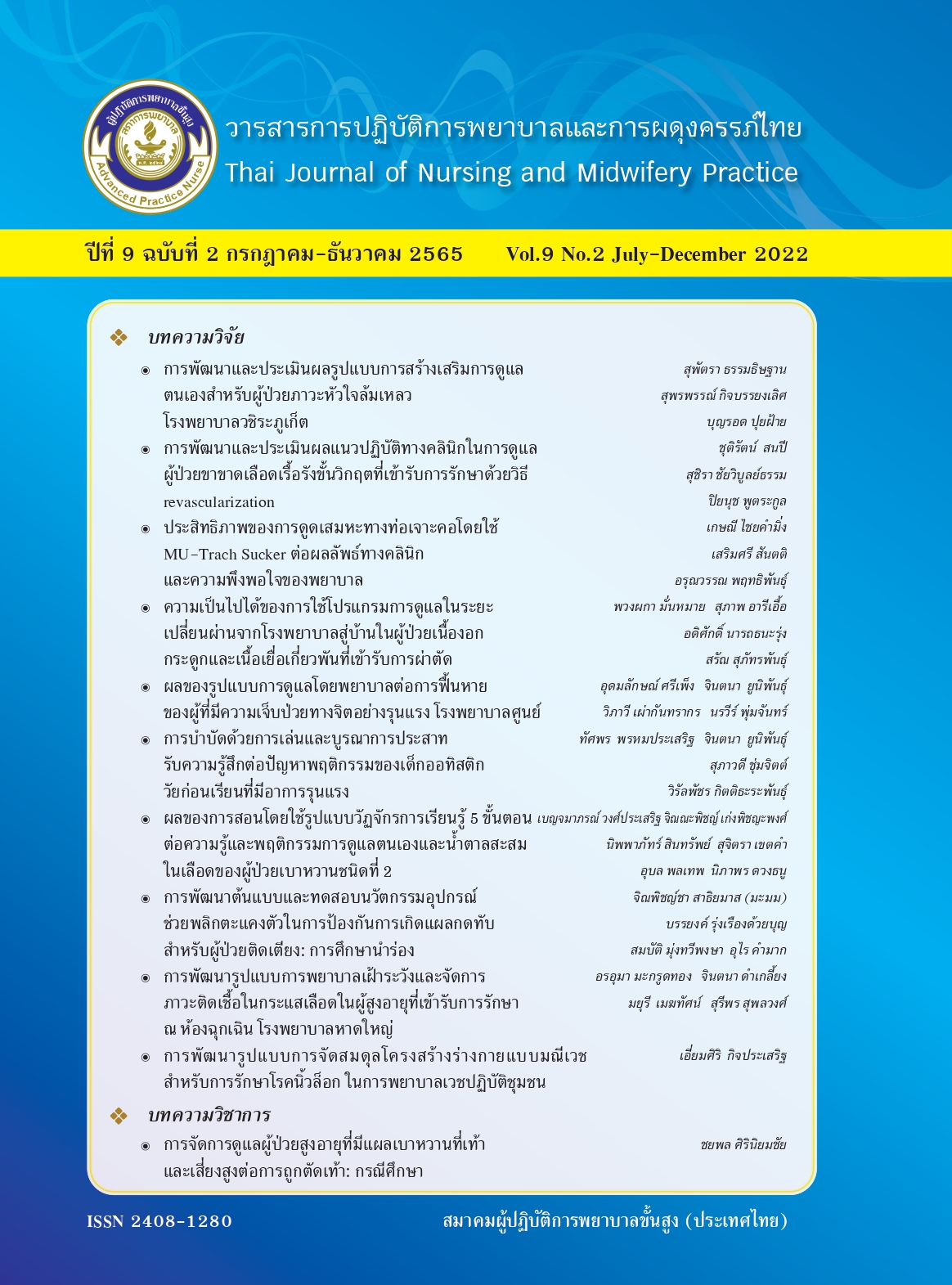The Effect of Nurse-Directed Care Model on Recovery among Persons with Severe Mental Illness, Regional Hospital
Main Article Content
Abstract
This quasi- experimental research, two groups pre-posttest design, aimed to compare recovery of patient with severe mental illness before and after receiving the nurse-directed care model by advance practice nurse and compare between the experimental and the control group. Sample were 40 patients with severe mental illness, recruited from the outpatient department of Regional Hospital and Medical Centers, were matched pairs by gender, age, disease and treatment sampling before randomly assigned to either experimental or control group equally (n=20). Experimental group received the nurse-directed care model for persons with severe mental illness consists of individual relationship therapy and group support psychotherapy to create hope for 4 weeks while the control group received a routine care. Research instruments for measuring the recovery was Thai- Mental Health Recovery Measure and The Brief Psychiatric Rating Scale which immediately assessed after the experiment. All instruments were examined for content and the reliability of the scale yielding of Cronbach’ alpha Coefficient was .96 and .97 respectively. Data were analyzed by independent t-test. The result showed that the mental health recovery of the experimental group after receiving the nurse-directed care model was significantly higher than that of the control group, (p<.05), and the mental health recovery of the experimental group was higher than before. It can be concluded that the nurse-directed care model led by advance practice nurse could be used for enhancing recovery among for persons with severe mental illness.
Downloads
Article Details

This work is licensed under a Creative Commons Attribution-NonCommercial-NoDerivatives 4.0 International License.
References
Sagar R, Sarkar S. General Hospital Psychiatry: Past, present, and the future. Journal of Mental Health and Human Behavior 2017; 22(1):1-3.
Hasselt FM, Thier CSM, Rijswijk E, Loonen AJ M. Is somatic health screening in patients with severe mental illness of added value. Perspectives in Psychiatric Care 2014; 50(3):186-192.
Substance Abuse and Mental Health Services Administration. Mental Health Annual Report 2017 Use of Mental Health Services: National Client-Level Data. U.S.: SAMHSA; 2019.
Jaruponprasit R, Suthiart A, Sirirat B, Damrongchat M. Statistical Thailand 2016. Nonthaburi: Office of Policy and Strategy Ministry of Public Health; 2016. (In Thai)
Center for providing services to psychiatric patients in Thailand. Report of patients receiving psychiatric services Department of Mental Health 2019. Available from: https://dmh.go.th/report/datacenter/hdc/. (In Thai)
Department of Mental Health Ministry of Public Health. Department of Mental Health Annual Report 2016. Bangkok: Bangkok Block Partnership; 2016. (In Thai)
Department of medical records and statistics. Report of cases of diseases for the year 2018. Bangkok: Bhumibol Adulyadej Hospital; 2018. (In Thai)
Aldersey H, Whitley R. Family influence in recovery from severe mental illness. Community Ment Health J 2014;51(4): 467-76.
Delaney KR. Psychiatric mental health nursing advanced practice workforce: Capacity to address shortages of mental health professionals. Psychiatric Serv 2017; 68(9): 952-4.
SAMHA. Measuring recovery from substance use or mental disorder: workshop summary. Washington: National Academies Press; 2016.
Rob W, Robert ED. Recovery: A dimensional approach. Psychiatric Serv 2010; 61(12): 1248-1250.
Panupisuth P, Puangladda S, Tachapisitpong A, Budsuwan P. The Effectiveness of recovery oriented programs on hope and Quality of life for person with serious mental illness: systematic review. The Journal of Psychiatric Nursing and Mental Health 2016; 30(1): 34-51. (In Thai)
Hayes L, Herrman H, Castle D, Harvey C. Hope, recovery and symptoms: the importance of hope for people living with severe mental illness. Australasian Psychiatry 2017; 25(6): 583-587.
Panyayong B, Kerdpongboonchot C. Academic Revival Articles: Reducing the stigma of having a mental illness. Journal of Mental Health of Thailand 2015; 23(1): 49-60. (In Thai)
Boonserm K,Yunibbhan J, Daungta K, Poomchan N. Effects of rehabilitation promotion on recovery of patients with bipolar disorder. Journal of Thai Nursing and Midwifery Practice 2019; 6(2): 70-85. (In Thai)
Sutapa T,Yunibbhan J , Phaokantakorn W , Kwansanit P. Effects of a recovery promotion program in patients with depression. Journal of Thai Nursing and Midwifery Practice 2020; 7(1): 118-32. (In Thai)
McIntosh D, Startsman L, Perraud S. Mini review of integrated care and implications for advanced practice nurse role. The Open Nursing Journal 2016; 10: 78-89.
Pilot DF, Beck CT. Nursing Research: Principles and Methods. 7thed. Philadelphia: Lippincott Williams & Wilkins; 2004.
Chang C-K, Hayes RD, Broadbent M, Fernandes AC, Lee W, Hotopf M, et al. All-cause mortality among people with serious mental illness (SMI), substance use disorders, and depressive disorders in southeast London: a cohort study. BMC Psychiatry 2010;10(1):77.
Yunibhand J. Health Nursing: Concepts and Case. Bangkok; 2008. (In Thai)
Peplau HE. Interpersonal relations in nursing A conceptual frame of reference for psychodynamic nursing. New York: Springer Publishing Company; 1991.
Yalom ID, Leszcz M. The theory and practice of group psychotherapy. 5 thed. New York: Basic Books; 2005.
Vorapatratorn N. Predicting factors of recovery among person with major disorder. [Dissertation]. Bangkok: Chulalongkorn University; 2017. (In Thai)
Overall JE, Gorham DR. The Brief Psychiatric Rating Scale (BPRS): Recent developments in ascertainment and scaling. Psychopharmacology Bulletin 1988; 24: 97-9.
Wattanabenjasopha S. The effect of palliative psychotherapy on the hope of cervical cancer patients receiving radiotherapy. [Dissertation]. Chiang Mai: Chiang Mai University; 2000. (In Thai)


